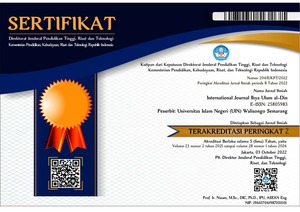 |
Reviewer Guidelines
Introduction
Thank you for agreeing to review a manuscript for the International Journal Ihya' 'Ulum al-Din. Your expertise and critical analysis are crucial to maintaining the quality and integrity of the scholarly work we publish. These guidelines aim to support you in providing a thorough, constructive, and fair evaluation.
1. General Expectations
- Expertise: Ensure that you have the necessary expertise in the relevant area of Islamic studies to assess the manuscript effectively. If you lack expertise in a certain aspect, it’s appropriate to decline the review request or request a more specific focus from the editorial team.
- Impartiality: Reviews should be objective and free of bias. Please avoid allowing personal beliefs, opinions, or conflicts of interest to influence your assessment.
- Confidentiality: Manuscripts and related materials should be treated as confidential documents. Do not share, discuss, or use any information from the manuscript for personal gain.
- Timeliness: Provide your review within the agreed timeframe. If, for any reason, you are unable to meet the deadline, please inform the editorial team promptly.
2. Manuscript Evaluation Criteria
When reviewing the manuscript, please consider the following aspects:
A. Relevance and Originality
- Does the manuscript address an important issue in the field of Islamic studies?
- Is the topic timely and relevant to current scholarly discussions?
- Does the paper contribute original ideas, perspectives, or methodologies to the field?
B. Research Quality
- Are the research questions or hypotheses clearly defined?
- Does the methodology (whether qualitative, quantitative, historical, theological, etc.) align with the research questions?
- Are the research methods rigorous and appropriate for the study?
- Does the analysis support the conclusions drawn?
C. Literature Review
- Does the author provide a thorough and up-to-date review of the relevant literature?
- Are the sources cited relevant, authoritative, and diverse, representing different schools of thought or traditions within Islamic studies?
D. Argumentation and Clarity
- Are the arguments presented in a logical, coherent manner?
- Are complex ideas explained clearly and without ambiguity?
- Is the manuscript well-written, free from jargon, and accessible to specialists and non-specialists?
E. Contribution to the Field
- Does the manuscript offer new insights into Islamic studies in terms of theology, history, law, philosophy, or other subfields?
- Does it challenge or expand existing scholarship in meaningful ways?
F. Ethical Considerations
- Is the manuscript free from ethical concerns, such as plagiarism, falsification of data, or manipulation of sources?
- If the paper involves human subjects (such as surveys or interviews), does it adhere to ethical research guidelines?
G. Formatting and Presentation
- Is the manuscript properly formatted according to the journal’s submission guidelines?
- Are citations and references correctly formatted and consistent throughout the manuscript?
- Does the manuscript adhere to the journal’s preferred citation style?
3. Types of Feedback
Please provide detailed, constructive feedback in the following categories:
A. Summary of the Manuscript
- Briefly summarize the manuscript's content, highlighting the research question, methodology, main arguments, and conclusions. This helps the authors and editors understand your perspective on the paper.
B. Strengths
- Identify the main strengths of the manuscript. What aspects of the paper stand out as particularly valuable or well-executed? Consider the quality of the argument, methodology, writing, and potential contribution to the field.
C. Weaknesses and Suggestions for Improvement
- Provide specific, actionable suggestions for how the authors can improve the paper. This could include clarifying arguments, improving structure, addressing gaps in the literature, or refining the methodology.
- If there are any major issues (e.g., methodological flaws, gaps in the literature, or unclear arguments), please provide detailed explanations.
D. Ethical Concerns
- If you notice any ethical concerns, such as issues with sources, citations, or research methodology, please highlight them and suggest how they could be addressed.
E. Overall Recommendation
- Provide a clear recommendation to the editorial team based on your assessment of the manuscript:
- Accept without revisions: The manuscript is ready for publication as is.
- Minor revisions: The manuscript can be accepted with minor revisions.
- Major revisions: The manuscript requires significant changes but could be reconsidered after revisions.
- Reject: The manuscript does not meet the journal's standards and should not be considered for publication.
4. Conflicts of Interest
If you have any conflicts of interest, whether personal, academic, or financial, please disclose them immediately to the editorial team. This includes prior collaborations with the authors, potential biases due to your views on the subject, or personal relationships.
5. Ethical Review
If applicable, please also assess whether:
- The study complies with ethical standards in Islamic research.
- The manuscript respects and considers the diversity of Islamic thought, ensuring inclusivity of various traditions and schools of thought (e.g., Sunni, Shia, Sufism, etc.).
- The paper demonstrates respect for cultural and intellectual diversity within the Islamic world.
6. Conclusion
Your review plays an integral role in shaping the quality of scholarship in Islamic studies. We greatly appreciate your time, thoughtfulness, and dedication to improving the manuscript. Please ensure that your feedback is constructive and respectful, keeping in mind that the goal is to help authors refine their work to benefit the academic community.
If you have any questions or concerns regarding the review process, please do not hesitate to contact the editorial team.

